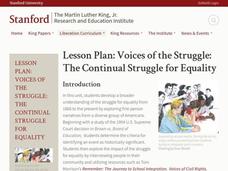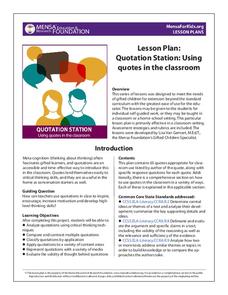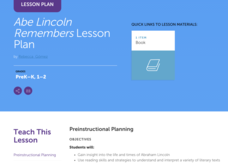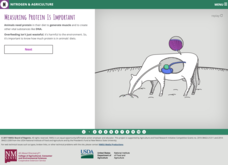Stanford University
Voices of the Struggle: The Continual Struggle for Equality
As part of a study of the Civil Rights Movement from 1868 to the present, class members examine first person narratives, the Supreme Court case Brown v. Board of Education, and other significant events in civil rights history. They then...
Missouri Department of Elementary
Feeling Faces
A instructional activity help scholars identify emotions through facial expressions. After a friendly puppet reads scholars a poem all about feelings, learners act out how they would feel when a specific action happens to them....
Workforce Solutions
Plan a Vacation
Challenge scholars to plan a vacation with a $5,000 budget. Learners review costs of transportation, meals, and entertainment while considering the number of people and destination. Worksheets provide information and well-organized...
Smithsonian Institution
We Have a Story to Tell: Native Peoples of the Chesapeake Region
How did colonial settlement and the establishment of the United States affect Native Americans in the Chesapeake region? Your young historians will analyze contemporary and historical maps, read informational texts, and work in groups to...
Brigham Young University
Introducing the Text and Learning the Process of Script Analysis
Where do directors and set designers get their ideas so that the set they build creates the mood and atmosphere the director wants for a production? From the script! Introduce theater high schoolers to the script analysis techniques used...
Newseum
Evidence: Do the Facts Hold Up?
Sometimes it's hard to escape bad information! Pupils learn the E.S.C.A.P.E. method for evaluating news sources and complete a worksheet to assess a news article using their new skills.
Newseum
Can I Trust the Creators?
It's easy to find information at the click of a mouse, but is it trustworthy? Pupils learn about the E.S.C.A.P.E. acronym for evaluating sources. Next, learners read a news story and evaluate its sources to determine credibility. Last,...
Missouri Department of Elementary
How Much Does Smoking Really Cost?
Following a brief survey about tobacco, scholars examine a fact sheet to answer questions about the substance. A practice page challenges the class to determine the cost of the habit using money math. Pupils discuss their findings...
Teach Engineering
Household Energy Conservation and Efficiency
Are your household devices eating up a lot of energy? Pupils investigate household energy efficiency through a set of activities. They find ways to improve energy efficiency and reduce consumption. This is the 21st installment of a...
Oakland Unified School District
Class Animal Report
Whether preparing your second graders for an expository writing proficiency assessment or just planning on introducing the writing process, this 37-page packet is for you. The unit has everything you need from scripted lessons to...
MENSA Education & Research Foundation
Quotation Station: Using Quotes in the Classroom
An informative list compiled with quotes, authors, and discussion questions, along with 20 out-of-the-box application ideas, make up the collection of lessons geared to spark dialogue and creative thinking about quotations.
Teach Engineering
Archimedes' Principle, Pascal's Law and Bernoulli's Principle
What do Pascal's law, Archimedes' Principle, and Bernoulli's Principle have to do with fluid mechanics? The included PowerPoint presentation provides the basic definitions and equations associated with the three. A set of homework...
Teach Engineering
It's Tiggerific!
Spring into elastic potential energy with a lesson that provides background information on determining the elastic potential energy of springs and other elastic materials. General energy equations emphasize the conservation of energy and...
Teach Engineering
Show Me the Money
Class members learn how to estimate the total costs involved to design and build a bridge by including design, material, equipment, and labor costs. The activity includes a discussion about the trade-off between cost and aesthetics.
Teach Engineering
Microfluidic Devices and Flow Rate
When you have to flow, you have to flow. The lesson introduces class members to microfluidic devices and their uses in medicine. They watch a short video on how the diameter affects the rate of flow. The worksheet has individuals...
Teach Engineering
Quantum Dots and the Harkess Method
The Fantastic Voyage is becoming close to reality. The class reads an article on the use of nanotechnology in the medical field and participate in a discussion about what they read. The discussion method helps class members become more...
Scholastic
Abe Lincoln Remembers Lesson Plan
Discover the life of Abraham Lincoln with help from the story Abe Lincoln Remembers by Ann Turner. After listening carefully, scholars reflect on what they deem as Lincoln's most influential life event and how it relates to them,...
Teach Engineering
Alloy Advantage
Mix it up by using an intriguing resource that teaches young metallurgists that alloys are a metal mixture. They learn about the advantages of using alloys over pure metals and investigate titanium alloys as an example to finish the...
NOAA
History's Thermometers
How is sea coral like a thermometer? Part three of a six-part series from NOAA describes how oceanographers can use coral growth to estimate water temperature over time. Life science pupils manipulate data to determine the age of corals...
Science 4 Inquiry
The Ups and Downs of Populations
As the reality of population decline across many species becomes real, pupils learn about the variables related to changes in populations. They complete a simulation of population changes and graph the results, then discuss limiting...
Spreading Gratitude Rocks
A Note of Gratitude
Gertrude Stein once said, "Silent gratitude isn't much use to anyone." Learners break their silence by engaging in discussion and making lists of what makes them grateful. Next, pupils write and illustrate a thank you letter to a chosen...
Open Oregon Educational Resources
Oregon Writes Open Writing Text
Are some resource books more confusing than helpful? The creator of Oregon Writes Open Writing Text thinks so. That is why the text remains a living document with input from teachers, librarians, and scholars. The eBook begins with...
Learning Games Lab
Nitrogen in Feed
Knowing what farmers are feeding livestock is just smart business. A WebQuest lesson helps learners build an understanding of the relationship between amino acids, nitrogen, and protein. With interactive instruction, scholars practice...
Learning Games Lab
Nitrogen in Fertilizer
Nitrogen is an essential element for productive farming. An interactive lesson explores the chemical makeup of different fertilizers and their corresponding nitrogen content. The interactive challenges individuals to complete molecular...
Other popular searches
- Environment Research Projects
- Country Research Projects
- Animal Research Projects
- Biology Research Projects
- Research Projects Grade 9
- Market Research Projects
- Science Research Projects
- Minnesota Research Projects
- Animals Research Projects
- Library Research Projects
- Research Projects Economics
- Author Research Projects

























